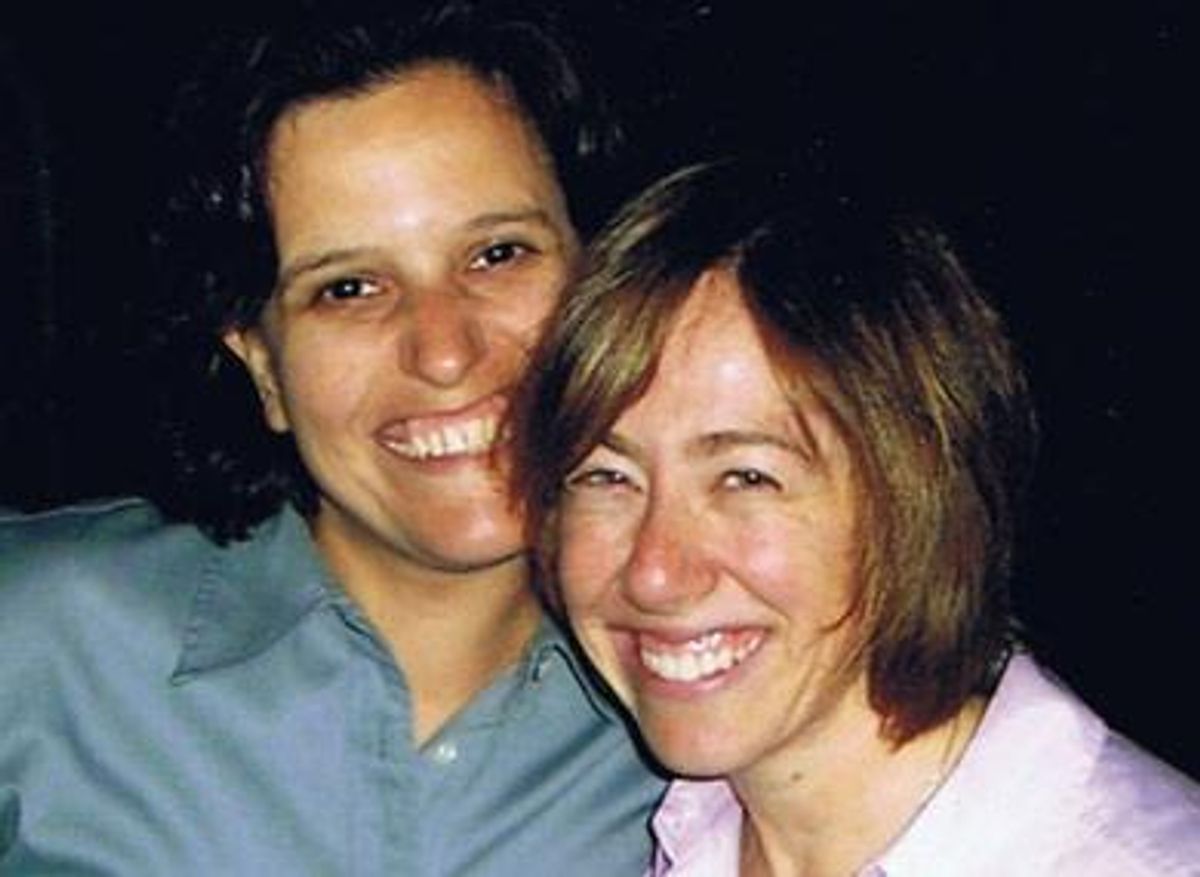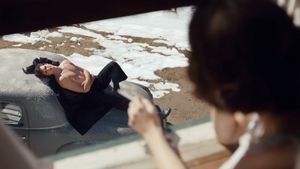Lisa Hazirjian
and her partner, Michelle, will join 15 other families on
the Obama-Biden whistle-stop train ride from Philadelphia to
the capital for the presidential inauguration on
January 20. The group of "Everyday Americans" is
scheduled to join the first family during inauguration
activities throughout the week. Hazirjian, a modern history
professor at Case Western Reserve University, led Obama
Pride in Cleveland after facing discrimination in her
career.
What motivated you to lend your support during the
2008 campaign season? As you know, I'm a professor, and I've been in a
series of one-year jobs, which is pretty common in my
field. I was offered a tenure track at a top-100
research university in a city where we have friends.
Michelle and I
were excited about the opportunity but also concerned
about the fact that the university did not offer
domestic-partner benefits. We could foresee the
potential for some problems with Michelle getting work
where we would be moving. During the contract negotiations I
raised this concern ... the department head, who had been
extremely enthusiastic about me coming up to that
point, was really hostile to me just raising this
issue, and a day and a half later revoked the job
offer. They refused to discuss things further with me, but
simply told me they were no longer considering my
candidacy.
Of course I had
no legal recourse. There is no state-level
nondiscrimination act, and obviously we don't have a federal
nondiscrimination act. I'm someone who, when something bad
comes my way, I want to think about how to keep that
from happening to other people. When I saw Barack
Obama talk about the passage of [the Employment
Non-Discrimination Act] and really being fully committed to
an inclusive ENDA, that resonated with me. He was the
candidate who could really deliver that message to
persuadable Americans. People who don't even know you
can have your job revoked because you're lesbian, gay,
bisexual, or transgender.
So what happened with your work situation after that? The last academic year I was on a nine-month
contract with Carnegie Mellon. Michelle and I, the
whole time, were commuting between Pittsburgh and
Cleveland. Prior to that I was at Case Western Reserve
University. Ultimately I was able to come back to Case
Western. My prior contract there was written in a way
that it was feasible to bring me back without doing a
national search. Both Carnegie Mellon and Case offered
domestic-partner benefits, and both are gay-friendly in
their policies.
You were a John Edwards supporter in the beginning.
What caused you to make the switch? I always really liked Obama. Early on I was
envisioning an Edwards-Obama ticket, but I was one of
those people who simply wanted to know more about him.
By the time Edwards dropped out of the race, I was really
impressed with Barack Obama's skills as a politician
as well as his intellect, his policy, his openness to
learning. All of that really impressed me. I also felt
that it was important to have a candidate who, ever
since he arrived on the national stage starting with his
speech at the 2004 Democratic National Convention, he
has always talked about gay issues in his speeches,
not just to gay audiences. He's also brought that
message to hostile audiences, those who we don't think of as
supporters. That's something that we really
need in a president, especially with someone who isn't
going to be in the Senate any longer passing through
legislation. What we really need is someone setting the tone
for the entire country, who is willing to reach out to
places where there is more resistance to our issues,
and say "Gay rights matter."
What are some of the issues that you think he
should really tackle in the coming term, that may or may
not be gay-specific. Obviously, it goes without saying, he's
entering the presidency, literally, at the worst time
ever in the memory of almost anyone who is alive
today. He's got a lot on his plate. He should
certainly get this economic crisis under control
pretty quickly and get our foreign policy back on
course. On the gay rights agenda, there are things that can
be done on executive order. I think that in
particular, extending nondiscrimination protection to
transgender federal workers is something that is such
a basic civil rights issue.
One of the most
moving experiences I had doing my work as Obama Pride
director was talking to a few transgender members in my
community. Neither one of them traditionally voted,
but they felt inspired by Barack Obama, in part
because he's really committed, in part committed to
including transgender rights, and what he would do on an
LGBT rights front. And also because issues that affect
all Americans, like the economic crisis, hit the
transgender people I know really hard. It's
already generally harder for them to get jobs than other
people.
Health care is
also a really big one. My partner and I have friends who
have been devastated by hospital bills this past year, and
that's even with health insurance. They've had
over $10,000 in medical bills over what was covered by
their insurance to deal with after a real
life-threatening situation.
Was your partner, Michelle, very active in the
campaign season? Michelle has often been politically active, and
she certainly helped out on this campaign. Her number
1 job was keeping me from having a physical breakdown
during the campaign. She entered an executive MBA program
this fall and she's working full time, so she
didn't have a whole lot of time to work on the
campaign. She definitely made a huge contribution to my
life, as she always does, by just being incredibly
supportive of my efforts and not getting too
frustrated when I didn't necessarily hold up my share
of the housework on the campaign.
How were you selected to spend the train ride and
inauguration activities with the Obamas and the Bidens? I don't know the exact selection process. We got
a phone call on New Year's Eve from someone at
the presidential inaugural committee letting us know
that this is happening. We had a hard time not telling
everyone immediately. But after the fact I did talk to
Jamie Citron, who was the national deputy director for
LGBT votes, who I had worked a lot with as Obama Pride
director. He remarked that I had done so much hard work on
the campaign. That seems to have been what distinguished me,
in part.
The grassroots
effort of people on the campaign is really what elected
Barack Obama. My work is really representative of that. I
was one of many lesbian, gay, bisexual, and
transgender people and allies in the state of Ohio,
who really dedicated themselves on this campaign. We
actually have an LGBT caucus in the Ohio Democratic
Party. According to them there were over 6,500
volunteers who were LGBT and ally volunteers. I've heard
people say in a couple of places that the combined Obama
Pride and the LGBT Pride contributed the most
volunteers than any group other than organized labor
in Ohio. It really shows what a tremendous impact that
LGBT voters can have on a grassroots level.
Do you get to spend any one-on-one time with the president-elect? I do know that we will have time to interact
with the President-elect and Michelle Obama and the
Bidens. I don't have the nitty-gritty details of the
trip yet and would actually imagine that they're still
ironing out the details. But it's the train
trip, and also a lot of events throughout the entire
inauguration, doing a lot of things as a whole entourage, so
we'll have plenty of opportunities to interact with the
Obamas and the Bidens and also with each other. I'm
really looking forward to meeting the other 15
families.


















































































